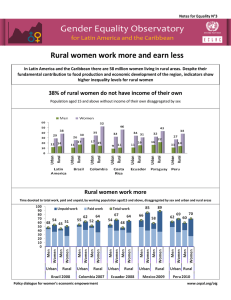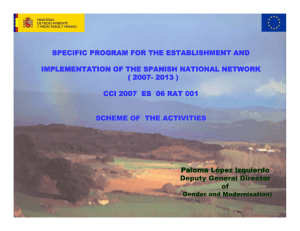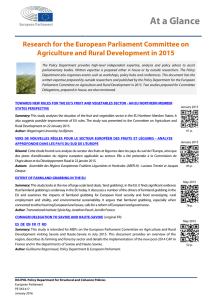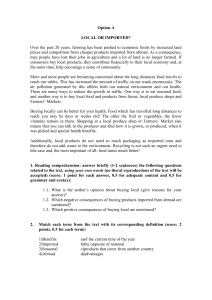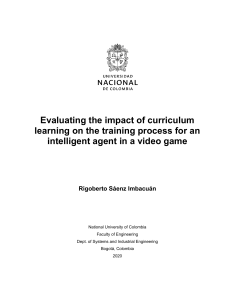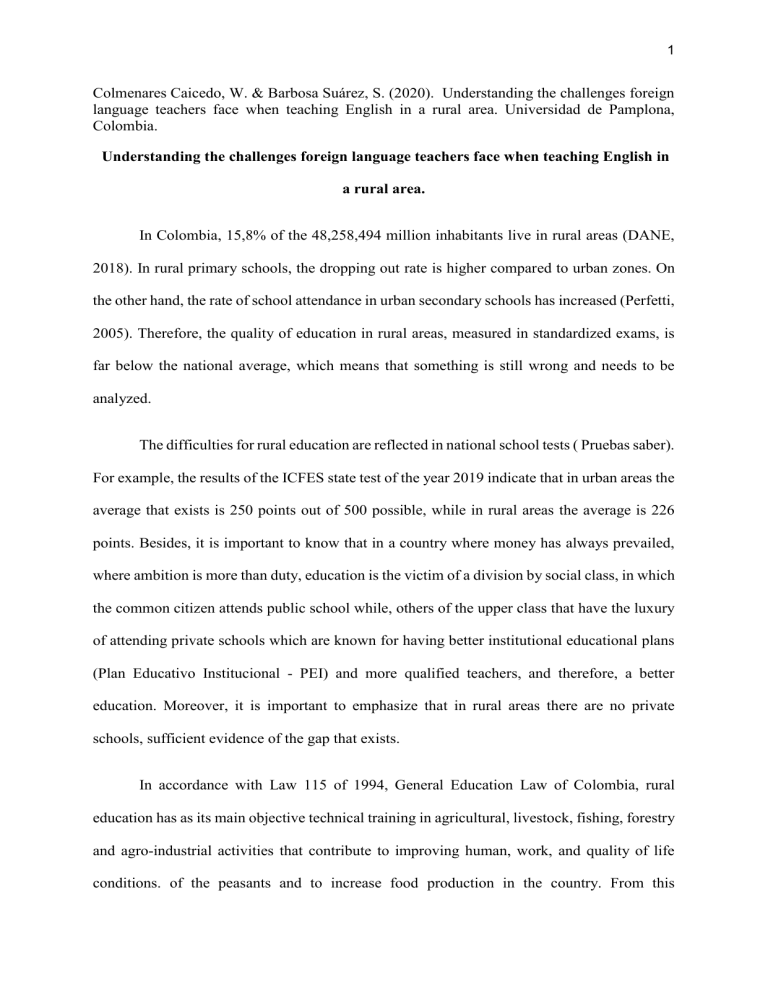
1 Colmenares Caicedo, W. & Barbosa Suárez, S. (2020). Understanding the challenges foreign language teachers face when teaching English in a rural area. Universidad de Pamplona, Colombia. Understanding the challenges foreign language teachers face when teaching English in a rural area. In Colombia, 15,8% of the 48,258,494 million inhabitants live in rural areas (DANE, 2018). In rural primary schools, the dropping out rate is higher compared to urban zones. On the other hand, the rate of school attendance in urban secondary schools has increased (Perfetti, 2005). Therefore, the quality of education in rural areas, measured in standardized exams, is far below the national average, which means that something is still wrong and needs to be analyzed. The difficulties for rural education are reflected in national school tests ( Pruebas saber). For example, the results of the ICFES state test of the year 2019 indicate that in urban areas the average that exists is 250 points out of 500 possible, while in rural areas the average is 226 points. Besides, it is important to know that in a country where money has always prevailed, where ambition is more than duty, education is the victim of a division by social class, in which the common citizen attends public school while, others of the upper class that have the luxury of attending private schools which are known for having better institutional educational plans (Plan Educativo Institucional - PEI) and more qualified teachers, and therefore, a better education. Moreover, it is important to emphasize that in rural areas there are no private schools, sufficient evidence of the gap that exists. In accordance with Law 115 of 1994, General Education Law of Colombia, rural education has as its main objective technical training in agricultural, livestock, fishing, forestry and agro-industrial activities that contribute to improving human, work, and quality of life conditions. of the peasants and to increase food production in the country. From this 2 perspective, we can witness that there is a great difference between urban and rural education since urban education focuses more on the student learning different subjects of vital importance for higher education, such as mathematics, English, philosophy or technology, and computing. Most of the beginner teachers do not have previous experience when making the preservice of teaching, because it is mainly focused on urban settings and not on rural which turns into a problem for those who do not feel well prepared to assume that labor. Brown (2003), states that a rural teacher has to be multitasking to teach multiple grades, plan extracurricular activities, and fit in the educational environment. What makes teaching in a rural area difficult is that the majority of teachers do not feel prepared because they completed their training in and for a mostly urban environment. Teachers in Colombia do not dare to teach in rural areas since it is a too difficult job for them and it is challenging to adapt and do so many activities for diverse small groups and communities due to lack of strategies and methods to use, maybe because the teacher is rookie or is not well prepared for this kind of setting. On the other hand, English teachers also may face factors like isolation, cultural adaptation, misconceptions that rural families have about education, motivation, infrastructure, and violence are some of the shortcomings which may make English teachers decide to work or not in rural areas (Ramos Holguín & Aguirre Morales, 2016). In relation to the aforementioned, it is also necessary that the voices of these English teachers that work in these areas need to be heard since the support they receive is little and in some way invite others to know in what conditions they work, and how they do so that their students have significant learning of this foreign language. 3 Consequently, the purpose of this proposal is to identify the main challenges faced by English teachers in rural areas from their perspective, what can be done to overcome or alleviate these, and how to face them. We will base our proposal on a narrative approach, working with stories and experiences of the teachers to be interviewed, gathering in this way as much as possible important information. In addition, this study is important not only for us as learners and future foreign language teachers, but also for our foreign language program as it contributes in a relevant way because this topic has not been studied before. Theoretical Framework This theoretical framework defines four key concepts to better understand the complexities of rural education: rural setting., rural education, rural school, and the relation between difficulty-challenge. With regard to rural educational settings, they are described as under-resourced and isolated spaces by highlighting the strengths of the school as a channel to connect the community with the teachers in these settings (Burton & Johnson, 2010; Ramos Holguín, B., & Aguirre Morales, J. 2016). Literature Review In Colombia, rural education has been affected since education was implemented in these areas considering the lack of resources, the existence of little technology and the difficult access are some of the problems that teachers generally face in this country, besides, the fact that they have to teach all the grades causes education to decrease, despite the contributions and projects 4 implemented by the government, these problems are still perceived, affecting both teachers and students. Therefore for English teachers, it is even more complicated, since considering all these issues, students receive their education in their mother tongue clearly, learning a different language is even more complex due to the lack of resources or teaching methods. Bonilla and Cruz (2013) emphasized on problems that teachers often had due to lack of technological access and many of them had to travel to be trained in these aspects since they did not have many methods for working in the rural area. Similarly to Grimaldi (2017) in which teachers did not have a variety of teaching strategies, students were not motivated to learn English, however some applied methods such as role-playing so that students acquire knowledge. Likewise Cruz Arcila (2018) due to the lack of resources, tried to develop their classes with worksheets and tended to use textbooks and the board that would allow them to make their classes better. They perceived this as an obstacle because they could only teach with these kinds of sources. The following is a scheme that contains all the papers conducted in Colombia. Recognizing invisibility: The positioning of rural English language teachers in the Colombian context. Cruz Arcila (2018). Critical Socio-Cultural Elements of the Intercultural Endeavour of English Teaching in Colombian Rural Areas. Cruz Arcila, Bonilla (2014). Enhancing EFL Speaking in Rural Settings: Challenges and Opportunities for Material Developers. Ramos Holguín, Aguirre Morales, Torres Cepeda (2018). 5 Interrogating the social impact of English language teaching policies in Colombia from the vantage point of rural areas. Cruz Arcila (2017). Sociocultural factors involved in the teaching of English as a foreign language in rural areas of Colombia: an analysis of the impact on teachers’ professional development. Research in Teacher Education Bonilla and Cruz (2013). La educación rural en Colombia: experiencias y perspectivas. Carrero Arango, González Rodríguez (2016). The Wisdom of Teachers’ Personal Theories: Creative ELT Practices From Colombian Rural Schools. Cruz Arcila (2018). Understanding the teaching of English as a foreign language at rural school Agua Clara. Cardona Ortiz (2017). English Language Teaching in Rural Areas: A New Challenge for English Language Teachers in Colombia. Ramos Holguín & Aguirre Morales (2016). Improving English learning in fourth-grade students from the rural school El Laurel in Molagavita through the role-playing method. Grimaldy Quiroga (2017). Coady, Lopez, Marichal, and Heffington's (2019) study aimed at preparing teachers for English language learners in rural settings. This research highlighted the lack of preparation to work with people who do not speak quite well English in the US; and how one teacher leader (TL) professional development (PD) program was carried out with the aim of preparing TLs for EL students in a rural school district in Florida. 6 The authors found that all the participants described their desire to learn new strategies that would enable them to help their ELs in schools and classrooms. The most common role among the participants was performing administrative duties such as translating, even when they had limited skills in other languages. A negative point was the district's unwillingness to grant buses, because the program was heavily dependent upon the providing buses for the students, to resolve the problem of transportation. Ferney Arcila (2017) questions the social impact with which educational policies promoting English have been associated with in Colombia, and how these have really helped to improve to quality education from the vantage point of rural areas. The participants from this study are 10 teachers located in seven different schools in seven different municipalities of four different regions of Colombia. In Colombia, according to the MEN (Ministerio de Educación Nacional) English has come to be seen as a crucial element in ensuring, among other things, the high quality of education, more opportunities to study and work, access to knowledge, cultural openness, competitiveness, and economic growth. Dealing with the foreabove, former president Juan Manuel Santos in 2015 implemented Colombia Bilingüe Programme (CBP), claiming that the promotion of English is a key component of a larger project of making Colombia “the best-educated country in Latin America by 2025”. Although this policy claims to make Colombia the most educated by 2025, it was only implemented in 350 institutions (most of them urban) out of 8200 registered nationwide. The United Nations Programme for Development (PNUD, by its initials in Spanish, 2011) reports that Colombia is more rural than traditionally acknowledged. Furthermore, 7 PNUD also explains that in Colombia what is rural is usually undervalued, since the development model of the country has conventionally been urban-oriented. As a matter of fact, in terms of education, only 48 out of 100 students in rural areas finish their basic education (9th grade), while 82 out of 100 do so in urban locations (Delgado, 2014). Furthermore, teachers' negative preconceptions of working in rural settings are common, but as soon as they started to know the rural context better, they began to notice that it could offer a rather comfortable environment for them to work in. Pitifully, as teachers become part of the rural communities by working with them, they also become subject to a lower appreciation and respect at the professional level. Factors such as the scarce availability of higher education programs in rural regions, low income, and the poor performance of rural students in national examinations (Matijasevic, 2014) continue to be major obstacles for rural students to access higher education. For some parents, in many cases, they did not have the chance to finish high school themselves and so for them, it might be sufficiently gratifying to see their children going beyond that point. The government should create and include more policies to improve the welfare of rural areas communities in order to inspire them to have a globalized vision of the world, including English as one of the main factors to succeed. Ramos Holguín & Aguirre Morales (2016) board some of the reasons why teachers do not select a job in rural zones in Colombia and suggest some strategies to overcome those issues that directly affect the quality of education of the children and youth of these areas. One of the most common problems in rural areas is the recruitment of teachers, whose are the key element to improve the quality of education, so they argue about the possible issues and negative preconceptions they may have when deciding to work in a rural zone. 8 The subjects of the research are pre-service teachers in the departments of Santander and Boyacá. Results from the base paper that was taken as the body to conduct this research showed that isolation, cultural adaptation, misconceptions that rural families have about education, motivation, infrastructure, and violence are some of the shortcomings which inhibit English teachers from working in rural areas. Furthermore, rural students can also lack motivation because they hardly travel outside their county and so they don't find interest in learning English. Based on the author's conclusions, aspects like attractive salaries, being heard, and the recognition of the effort made by those teachers that work in rural settings are some of the main characteristics that need to be taken into account when applying a new policy focused in the rural areas. Scott, Walker, and Stone (2007) examine the challenges faced by rural school districts in general, and one in particular, in providing ‘best practices’ for their English language learners in a Minnesota rural area under the pseudonym of ‘’Hanen’’. A group of six people gathered by the University of Minnesota were the participants of this research. According to a program named No Child Left Behind (NCLB) that looks forward to helping English Learners that speak a different language from English, a two-year teacher professional development program to address issues of curriculum, instruction, and assessment of second language learners was carried out. Conducted in a place known under the pseudonym of ''Hansen''. The author suggested that we need to keep into account the following aspects when helping English learners: 1. recognition of the existence of English language learners; 2) 9 responsibility on the part of all school staff to meet ELL learning needs; and 3) respect for each language learner as shown by respect for the ESL profession when programs are held to the highest standards. Since their initial TEAM UP meetings during the summer of 2005, Hansen’s ELL population has continued to increase, though overall district enrollment has dropped dramatically. As numbers continue to tell one story, the Hansen team is intent upon telling theirs. Ramos Holguín, Aguirre Morales, Hernández's (2012) paper purpose was to integrate eleventh graders’ rural context through the design of curricular units in order to help them reflect upon and value their own culture using English. The participants are seventeen boys and seventeen girls who range in age from fifteen to eighteen years old. After implementing the curricular units, information was collected through a journal, a semistructured interview, and students’ surveys. Authors suggest that it is important to create an atmosphere that help learners enjoy their English classes because they could relate the knowledge they had acquired at home to learning English. Teachers need to broaden their views regarding their students’ culture. In this sense, teachers should avoid stereotypes that may brand their students as “good” or “bad,” “poor” or “rich,” “gifted” or “less gifted,” or any other kind of classification. Also, teachers should see their students as individuals with specific needs and diverse backgrounds that belong to certain social groups, more than seeing students as equal members with the same characteristics, needs, and interests in society. 10 Cardona Ortiz (2017) paper has as main goal to comprehend how EFL is taught in a rural school in Agua Clara, Colombia. With the help and permission of a teacher that already worked there, the author was able to gather data through the experiences of the teacher observed and personal thoughts during the process. The participant in the research is a teacher of a rural school: Agua Clara, with 21 students from different levels (primary mostly) Cooperative work reigned within the classroom in order to facilitate children learning process and teachers' impartation of knowledge. One limitation of this research was that the author had to observe just one hour of English class because of the schedule of the rural school she was working with. Bolaños, Gómez, Ramirez, & Tello (2018) paper state that teachers in rural and urban contexts become socially and culturally committed to addressing the learning needs of EFL in classrooms to create a good social perspective to education. Participants are five pre-service teachers that were chosen to explore a local community of a Colombian rural school with a group of 36 ninth-grade EFL students. In this, students carried out a series of tasks aimed at raising their awareness about their identity, questioning their surroundings, and increasing their self-confidence while using their knowledge of English. Teaching in rural areas is a way to contribute to quality education in Colombia. The English language is not seen as a priority for rural students, so for helping them it's necessary to implement curriculums in which students can connect with the language by using it in their communities. Kumar and Malekar (2017) attempted to describe the problems of teaching English in rural schools of India. In this country, lack of trained teachers in rural areas has become a reality. The teachers in rural India are often debarred from attending workshops and seminars to acquaint themselves with new ways and methods. 11 The authors found that students find themselves unable to express in English and never realize the importance of learning English as a language. Moreover they found that teaching English through the Grammar-Translation Method makes them dependent on their mother tongue. Students of the rural schools faced a number of problems. English is their second language, they do not know the correct pronunciation, spellings, and grammatical rules. There is a lack of confidence to speak in English. Teachers had a good accent, but they do not maintain excellent control over the language. Mahroof Hossain (2016) the author found that students were highly motivated to learn English for future expectations such as local and international communication; and academic advancement and employment prospects. The author also found that in rural areas of Bangladesh, urban students are comparatively adroit in the English language because school teachers are skilled in English language teaching and they get support from parents and house tutors. In rural areas, most of the parents are not educated and unable to spend money on a private tutor. Bonilla and Cruz (2013) attempted to understand the complexity of teachers’ professional development considering the particularities of the local work settings in three rural areas (Turmequé, Boyacá, Fusagasugá, Cundinamarca, Rural area of Bogotá, and Mistrató, Risaralda). The participants were María, Martín, Mónica, Magda and Manuel. Findings revealed that the participant’s experiences become more powerful than attending academic conferences or formal courses. Additionally, most of them reported, travelling long distances to receive training in themes like technology – training that often cannot be applied due to lack of access to computers – makes them feel it is more fruitful to spend time with the rural community and to be able to relate what they do with their class. 12 Shipra Biswas (2018) attempted to analyze the scenario—as well as the challenges and perspective of teaching-learning English at BRAC Primary Schools in the context of the rural area in Jessore. The participants were 50, among them, 30 from grade 5th and 20 from grade 6th and the data was collected with interviews and questionnaires. The author found that all the teachers of rural BRAC primary admitted that they had not received any professional or even subject-related training in English. And the author also found that most of the teachers mentioned that they used only the textbooks as the main materials and sometimes used blackboard, chalk and duster. One of the teachers said that she sometimes used visual aids like cards. The supplementary materials were very useful and matched with the objectives of the lesson. However, all of the teachers said that they did not get any support to use extra teaching materials from the office. They also claimed that they took six classes everyday and as a result, they did not get interested in using extra teaching aids. According to the importance of all criteria of English level, all students of rural BRAC primary schools opinion, 50% mentioned that their English level was poor, 40% mentioned that their English level was okay, 7% mentioned that their English level was good and only 3% mentioned that their English level was excellent. Heri Mudra (2018) aimed to describe and disseminate the obstacles experienced by pre-service teachers, teaching English in rural schools during their Teaching Practicum Program (TTP). Seventeen pre-service teachers participated in the qualitative study. Interviews and observations were the main methods of data collection. The author found that there were various obstacles of teaching English in rural schools in Indonesia in terms of teachers’ control over the classroom, teachers’ difficulties in finding learning materials or resources, teaching aids or media, teaching methods, learners’ English skills, choice of language use, slow internet connectivity, learners’ motivation, evaluation 13 technique, and parents’ support. Also several teachers kept using the books as provided by the school, while the others went on with their creative ways of thinking. Providing updated, contextual, and communicative materials was deemed as a creative way. They surfed some websites containing required learning materials, and downloaded some related files. The files were then compiled as learning materials. The learners were interested in the EFL lessons which used such materials. Cruz Arcila (2018) aimed to contribute to combating such relegation and invisibility of rurality by bringing to the fore teachers’ voices. Ten teachers participated in this study. The author found that despite the difficulty of working in a rural area due to the lack of technological methods, one of the participants used a block to share worksheets and interactive activities for his students, as she explained, her challenge was to make available those resources without the need of internet access, which at that time was still unsolved. Cruz also found that other participants used memorization, translation, and transcription of texts. These pedagogic strategies are often labeled as traditional, of little use, and ineffective in current communicative trends of language teaching. Rafique, Sultan, Ahmad, Lecturer, and Imran (2018) This study aimed to investigate the factors behind the non-implementation of English Language as a medium of instructions or why the English language is not implemented properly and the benefits that students will get after the implementation of policy. Participants were primary teachers from two schools from the district. It was discovered that teachers were not fully prepared while entered in class to deliver a lesson. Activities in English learning class were based on reading and translation methods from textbooks. There are certain reasons behind these problems as teachers at primary schools are overburdened with multi-grade teaching, so they find no time to correct students 14 or involve them in different activities to overcome their problems. It is observed in classrooms that there was only focus on reading instead of writing and listening. Reading was considered a way to get knowledge and new ideas. Although other skills are important to express thoughts and ideas conventionally, unfortunately, students were headed to swat up grammar rules. Ameiruel Azwan Ab Azizl, Suyansah Swanto, and Sheik Badrul Hisham Jamil Azhar (2019) The purpose of this phenomenological case study was to shed light and describe the lived experiences of ten English teachers who persist in rural schools in Sabah, Malaysia. Findings of this study suggested that teaching English in rural schools is perceived to be a stressful profession, as all of them expressed that they did not find teaching in rural schools as enjoyable but rather a grappling and taxing task. The findings also indicated that the sources of stress recognized by teachers in this study have a strong relationship with the disadvantages of the teaching and learning environment in rural schools. This relationship was something to which the teachers believed related to their stress. Although the teachers have described that they operated in an unsupportive environment for English language teaching and learning, it was not perceived as a significant aspect of their decision to remain to teach in rural schools. Grimaldy Quiroga (2017) is about improving English learning in students from fourthgrade conducted in Molagavita Santander through the role-playing method. It focused on a learning methodology that teachers in this area considered a good mechanism to make their students learn. This study aimed to improve the communicative skills of primary school students. The project was applied over two months and the participants were students from fourth-grade and the method to collect the data were activities that included role-plays, with videos, reading exercises, completing conversations. The findings revealed that the students 15 at the beginning were a little lost because they had not tried this method before, after this, they were more interested in this mechanism since they were first motivated with games, they were more confidence when expressing something that they wanted to say and traid to speak, this was an effective learning method because the students wanted to continue working in this way with their teacher. Difficulties when teaching English & Rural areas disadvantages English language is a global language, and despite teaching in rural or urban settings, teachers have to deal with many challenges and often doubts about what method is the best to teach. English plays an important role like a channel of communication (Kannan, 2009), and teaching English in countries where English is not the L1 may be difficult because the students can not use L2 in real-life situations, so they are limited to work with sentences in textbooks in a not real environment. In order to improve the ways of teaching, teachers commonly have formulated through the years questions like: *What are the benefits of learning the English language? *How can teachers teach English as a foreign or second language in different situations? *What do teachers know about second language learners with different abilities? By answering the aforementioned questions, teachers are able to create and implement their own way of teaching, in this way, students will receive as much knowledge as they can and so improve their English skills. However, despite the efforts of English teachers around the world, they still struggle to teach in rural and urban settings. In this case, we will focus only on the rural environment, and according to Ramos Holguín, B., & Aguirre Morales, J. (2016), the most common problems that English teachers face when teaching in this environment are Isolation, cultural adaptation, misconceptions that rural families have about education, motivation, infrastructure, and violence are some of the shortcomings. 16 Difficulties when teaching English (papers related) Research articles Author(s) Coping with stress: Exploring the lived experiences of English teachers who persist in Malaysian rural schools. Azwan Azizl, Swanto, and Jamil Azhar (2019). English Language Teaching in Rural Areas: A Scenario and Problems and Prospects in Context of Bangladesh. Mahroof Hossain (2016). Challenges of Teaching English in Rural Areas: A Study of BRAC Primary Schools in Jessore . Shipra Biswas (2018). The Wisdom of Teachers’ Personal Theories: Creative ELT Practices From Colombian Rural Schools. Cruz Arcila (2018). Difficulties in teaching English to rural students. Kumar and Malekar (2017). Improving English learning in fourthgrade students from the rural school El Laurel in Molagavita through the roleplaying method. Grimaldy Quiroga (2017). Teachers’ Role in Implementation of English Language Teaching Policies in Public Primary Schools of Rural Area in Punjab, Pakistan. Rafique, Sultan, Ahmad, Lecturer, and Imran (2018). English Language Teaching in Rural Areas: A New Challenge for English Language Teachers in Colombia. Ramos Holguín & Aguirre Morales (2016). Educating English Language Learners in a Rural District: A Case in Point. Scott Edstam, Walker, Stone (2007). Understanding the teaching of English as a foreign language at rural school Agua Clara. Cardona Ortiz (2017). Rural areas disadvantages (papers related) 17 La educación rural en Colombia: experiencias y perspectivas. Carrero Arango, González Rodríguez (2016). Sociocultural factors involved in the teaching of English as a foreign language in rural areas of Colombia: an analysis of the impact on teachers’ professional development. Research in Teacher Education Bonilla and Cruz (2013). Pre-Service EFL Teachers’ Experiences in Teaching Practicum in Rural Schools in Indonesia. Heri Mudra (2018). Interrogating the social impact of English language teaching policies in Colombia from the vantage point of rural areas. Cruz Arcila (2017). Recognizing invisibility: The positioning of rural English language teachers in the Colombian context. Cruz Arcila (2018). Educating English Language Learners in a Rural District: A Case in Point. Scott, Walker, and Stone (2007). Enhancing EFL Speaking in Rural Settings: Challenges and Opportunities for Material Developers. Ramos Holguín, Aguirre Morales, Torres Cepeda (2018). Socio-economic Characteristics and English Language Achievement in Rural Bangladesh. Obaidul Hamid (2011). Critical Socio-Cultural Elements of the Intercultural Endeavour of English Teaching in Colombian Rural Areas. Improving education in rural areas: Guidance for rural development specialists. Methodology Cruz Arcila, Bonilla (2014). Moulton (2001). 18 This study will be guided by the Constructivist Paradigm, according to Hatch (2002), the researchers and the participants in their studies are joined together in the process of coconstruction (collaborative learning process), so that is impossible and undesirable for researchers to be distant and objective. A process of co-construction will be carried by listening the participant's experiences that he has gone through while teaching English in a rural area, the researchers and the participant will construct a whole understanding of what teaching English in a rural area is. In addition, taking into account that this research attempts to identify the main challenges faced by English teachers in rural areas, a qualitative approach will be applied with a narrative research design. narrative can be both a method and the phenomenon of study. As a method, it begins with the experiences as expressed in lived and told stories of individuals. (Creswell 2007, p. 53). Our study will focus on a narrative approach, which is a qualitative study, our method of collecting the data will be through interviews that will be provided to the participant, in which the experiences of this participant regarding the challenges he faces as an English teacher in the rural area where he works will be related. Participants Due to the nature of this study a convenience sampling technique will be used to select the participants, in this way, selecting a participant that is related with the main topic of this study will facilitate the process. The participant of this research is an English teacher from a rural public institution situated in the department of Cordoba, known as Sabaneta, which is 15 minutes away from the municipality of Momil. Instruments Data will be collected through interviews over ten weeks, where the participant (an English teacher) will participate by answering different questions related to their work in rural areas. Data collection Semi-structured interviews and sessions to speak freely about his experiences will be used, so that way the researchers will not miss any detail that may result important for the research. Five 19 interviews and 3 speak freely sessions will be conducted. Interviews will be held every other week, and the speak freely sessions interspersed with the interviews, to give the participant a break. Limitations of the study Taking into account the health emergency of the COVID-19 pandemic, it may be a problem for researchers to carry out the data collection process with more than one participant since, due to this, it has only been possible to specify the participation of only one it could become an inconvenience in the future if the participant abandons or does not meet the expectations of the possible expected findings. Ethical Issues The consent of the participant will be obtained before using his information for this study, the teacher will be able to decline his participation in the interviews that will be carried out and his name will remain anonymous or will be altered, as in this research these data collection interviews will take into account the ethical implications that this entails, only researchers will have direct access to the information collected. Papers read so far Research articles Author(s) Coping with stress: Exploring the lived experiences of English teachers who Azwan Azizl, Swanto, and Jamil Azhar (2019). 20 persist in Malaysian rural schools. English Language Teaching in Rural Areas: A Scenario and Problems and Prospects in Context of Bangladesh. Mahroof Hossain (2016). Challenges of Teaching English in Rural Areas: A Study of BRAC Primary Schools in Jessore . Shipra Biswas (2018). The Wisdom of Teachers’ Personal Theories: Creative ELT Practices From Colombian Rural Schools. Cruz Arcila (2018). Difficulties in teaching English to rural students. Kumar and Malekar (2017). Improving English learning in fourthgrade students from the rural school El Laurel in Molagavita through the roleplaying method. Grimaldy Quiroga (2017). Teachers’ Role in Implementation of English Language Teaching Policies in Public Primary Schools of Rural Area in Punjab, Pakistan. Rafique, Sultan, Ahmad, Lecturer, and Imran (2018). English Language Teaching in Rural Areas: A New Challenge for English Language Teachers in Colombia. Ramos Holguín & Aguirre Morales (2016). Educating English Language Learners in a Rural District: A Case in Point. Scott Edstam, Walker, Stone (2007). Understanding the teaching of English as a foreign language at rural school Agua Clara. Cardona Ortiz (2017). La educación rural en Colombia: experiencias y perspectivas. Carrero Arango, González Rodríguez (2016). Sociocultural factors involved in the teaching of English as a foreign language in rural areas of Colombia: an analysis of the impact Bonilla and Cruz (2013). 21 on teachers’ professional development. Research in Teacher Education Pre-Service EFL Teachers’ Experiences in Teaching Practicum in Rural Schools in Indonesia. Heri Mudra (2018). Interrogating the social impact of English language teaching policies in Colombia from the vantage point of rural areas. Cruz Arcila (2017). Recognizing invisibility: The positioning of rural English language teachers in the Colombian context. Cruz Arcila (2018). Educating English Language Learners in a Rural District: A Case in Point. Scott, Walker, and Stone (2007). Enhancing EFL Speaking in Rural Settings: Challenges and Opportunities for Material Developers. Ramos Holguín, Aguirre Morales, Torres Cepeda (2018). Socio-economic Characteristics and English Language Achievement in Rural Bangladesh. Obaidul Hamid (2011). Critical Socio-Cultural Elements of the Intercultural Endeavour of English Teaching in Colombian Rural Areas. Cruz Arcila, Bonilla (2014). Improving education in rural areas: Guidance for rural development specialists. A Pedagogical Experience to Delve Into Students’ Sense of Cultural Belonging and Intercultural Understanding in a Rural School. Moulton (2001). Ramos Holguín, Aguirre Morales, References Hernández (2012). 22 -DANE, 2018. https://www.dane.gov.co/index.php/estadisticas-por-tema/demografia-ypoblacion/censo-nacional-de-poblacion-y-vivenda-2018/donde-estamos -Azwan Azizl, Swanto, and Jamil Azhar (2019). Coping with stress: Exploring the lived experiences of English teachers who persist in Malaysian rural schools. https://ejournal.upi.edu/index.php/IJAL/article/view/15249 -Bonilla and Cruz (2013). Sociocultural factors involved in the teaching of English as a foreign language in rural areas of Colombia: an analysis of the impact on teachers’ professional development. Research in Teacher Education. https://www.uel.ac.uk/wwwmedia/microsites/riste/Article-4.pdf -Carrero Arango, González Rodríguez (2016). La educación rural en Colombia: experiencias y perspectivas. https://revistas.uniminuto.edu/index.php/praxis/article/view/1377/1312 -Cruz Arcila, Bonilla (2014): Critical Socio-Cultural Elements of the Intercultural Endeavour of English Teaching in Colombian Rural Areas. http://www.scielo.org.co/scielo.php?script=sci_arttext&pid=S165707902014000200009&lng=es&nrm=iso&tlng=en -Cruz Arcila (2017): Interrogating the social impact of English language teaching policies in Colombia from the vantage point of rural areas. https://journal.spera.asn.au/index.php/AIJRE/article/view/117 -Cruz Arcila (2018). The Wisdom of Teachers’ Personal Theories: Creative ELT Practices From Colombian Rural Schools. http://www.scielo.org.co/scielo.php?script=sci_arttext&pid=S165707902018000200065&lng=es&nrm=iso&tlng=en -Cruz Arcila (2018): Recognizing invisibility: The positioning of rural English language teachers in the Colombian context. https://kclpure.kcl.ac.uk/portal/files/93906229/2018_Cruz_Arcila_Ferney_1335460_ethe sis.pdf -Derly Viviana (2017): Understanding the teaching of English as a foreign language at rural school Agua Clara. https://repository.usta.edu.co/bitstream/handle/11634/4330/CardonaDerlis2017.pdf?seq uence=1&isAllowed=y -Grimaldy Quiroga (2017): Improving English learning in fourth-grade students from the rural school El Laurel in Molagavita through the role-playing method. 23 https://repository.unad.edu.co/bitstream/handle/10596/25521/lmgrimaldyq.pdf?sequenc e=1&isAllowed=y -Heri Mudra (2018): Pre-Service EFL Teachers’ Experiences in Teaching Practicum in Rural Schools in Indonesia. https://pdfs.semanticscholar.org/31b5/7c042e80e1dadf4b7c2b3e9b026518cba23d.pdf?_g a=2.43109989.1727541216.1589526499-460167231.1589526499 -Kumar and Malekar (2017): Difficulties in teaching English to rural students. http://www.ijrar.org/papers/IJRAR1903996.pdf -Mahroof Hossain (2016): English Language Teaching in Rural Areas: A Scenario and Problems and Prospects in Context of Bangladesh. https://www.academia.edu/23498668/English_Language_Teaching_in_Rural_Areas_A_ Scenario_and_Problems_and_Prospects_in_Context_of_Bangladesh -Moulton (2001): Improving education in rural areas: Guidance for rural development specialists. http://citeseerx.ist.psu.edu/viewdoc/download?doi=10.1.1.197.9341&rep=rep1&type=pd f -Obaidul Hamid (2011): Socio-economic Characteristics and English Language Achievement in Rural Bangladesh. http://citeseerx.ist.psu.edu/viewdoc/download?doi=10.1.1.679.2439&rep=rep1&type=pd f#page=31 -Rafique, Sultan, Ahmad, Lecturer, and Imran (2018): Teachers’ Role in Implementation of English Language Teaching Policies in Public Primary Schools of Rural Area in Punjab, Pakistan. http://www.languageinindia.com/april2018/rafiquelanguagepolicyenglishpakistanfinal1. pdf -Ramos Holguín & Aguirre Morales (2016): English Language Teaching in Rural Areas: A New Challenge for English Language Teachers in Colombia. https://www.redalyc.org/articulo.oa?id=322243845010 -Ramos Holguín, Aguirre Morales, Torres Cepeda (2018). Enhancing EFL Speaking in Rural Settings: Challenges and Opportunities for Material Developers. Tunja: Editorial Uptc -Scott Edstam, Constance Walker, Karla Stone (2007): Educating English Language Learners in a Rural District: A Case in Point. 24 https://conservancy.umn.edu/bitstream/handle/11299/109976/T_Edstam_C_Walker_K_ stone.pdf?sequence=1&isAllowed=y -Shipra Biswas (2018): Challenges of Teaching English in Rural Areas: A Study of BRAC Primary Schools in Jessore. http://dspace.bracu.ac.bd/xmlui/bitstream/handle/10361/10816/15277005_BIL.pdf?sequ ence=1&isAllowed=y https://www.coursehero.com/file/p3t6o8r/Research-Methodology-According-to-Kothari2004-research-methodology-is-a-method/ USEFUL INFORMATION Concept of rural education In order to give effect to the purposes of articles 64 and 65 of the Political Constitution, the National Government and territorial entities will promote a rural, formal, non-formal and informal education service, subject to development plans. This service will especially include 25 technical training in agricultural, livestock, fishing, forestry and agro-industrial activities that contribute to improving human conditions, work and quality of life for peasants and increasing food production in the country. The secretariats of education of the territorial entities, or the organisms that act as their substitutes, in coordination with the secretariats of Agriculture of the same, will guide the establishment of Institutional Projects for Rural and Rural Education, adjusted to regional and local particularities. Teachers' characteristics Every teacher - without considering their background - must have appropriate training to appropriately help students of diverse linguistic and cultural backgrounds. In a study conducted in Canada by Faez (2012), teachers enrolled in a study named ‘ESL-Cohort’ training were more prepared to teach ESL (English as a second language) than those who were not enrolled in the program. As an example of the aforementioned, Rafique, Sultan, Ahmad, Lecturer, and Imran (2018) maintain that teachers in Punjab, Pakistan without many teaching methods felt very incapable of doing translations, so they focused just on the reading skill since this was the major method of learning. 26

